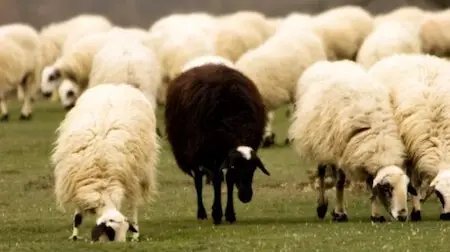A disreputable or disgraced member of a family.
Black sheep of the family
What's the meaning of the phrase 'Black sheep of the family'?
What's the origin of the phrase 'Black sheep of the family'?
Old joke alert – let’s just get this out of the way before we begin:
Yokel 1: “Why do black sheep eat less than white sheep?”
Yokel 2: “There aren’t as many of them.”
‘Black sheep’ is rather an odd phrase to choose to epitomise worthlessness. Why sheep? Badgers, dolphins, pandas and penguins, which are all primarily black, are considered cute. First thoughts might suggest that it came about because of the linking of black things with bad things, which is a long standing allusion in English texts – black mood, black looks or (where I come from) the Black Country. It may also be because shepherds disliked black sheep as their fleeces weren’t suitable for dying and so were worth less than those of white sheep.
In fact, it is more likely to have derived from a bit of misinterpretation by the writers of early English Bibles. Myles Coverdale’s 1535 Bible, which was the first complete bible printed in English, renders Genesis 30:32 as:
‘All blacke shepe amonge the lambes’
which Coverdale had translated from a German source text. Like bloggers and web publishers these days, the writers of early bibles copied from each other without checking their sources. Other bibles have the text as ‘all the browne cattell among the sheepe’ or ‘every speckled and spotted sheep and every black lamb’. In the original texts, the Genesis 30:32 story is that the shepherd Jacob suggested that he remove any spotted, dark or otherwise identifiable sheep or goats from his master’s flock in order to be able to later demonstrate that he hadn’t stolen any white ones. The ‘black sheep’ were actually a mark of integrity rather than disrepute.
The ‘Chinese whispers‘ of the early bible versions caused the original meaning to become lost and confused readers into the belief that the dark sheep were removed because they were worthless.
The first record of ‘black sheep’ in a derogatory sense that I can find in print is from an English Puritan who emigrated to America in 1635, the appropriately named Thomas Shepard, in the evangelical text The Sincere Convert, 1640:
Cast out all the Prophane people among us, as drunkards, swearers, whores, lyers, which the Scripture brands for blacke sheepe, and condemnes them in a 100. places.
Meanwhile, back in England, black sheep maintained the same status as black cats. The long-standing English country tradition that black sheep are omens of good fortune remained until the 19th century. The Folk-Lore Record, 1878, included this piece:
“We speak figuratively of the one black sheep that is the cause of sorrow in a family; but in its reality it is regarded by the Sussex shepherd as an omen of good luck to his flock.”
Baa, Baa, Black Sheep is one of the oldest English nursery rhymes and was first printed in Tommy Thumb’s Pretty Song Book, circa 1744 and is certainly much older than the 18th century. The original printed form is almost the same as the version familiar today:
Bah, Bah a black Sheep,
Have you any Wool?
Yes merry have I,
Three Bags full,
One for my master,
One for my Dame,
One for the little Boy
That lives down the lane
Like most nursery rhymes, the interpretation of the text is a source of debate. It has been suggested in recent years that it contains a racial slur which, to this reader at least, seems speculative and based on little more than it includes the word ‘black’. If there is a negative connotation it is that the rhyme may refer to the unpopular export tax on wool imposed in 1275.
That country lore was overtaken by the figurative use of the ‘black sheep’ that we now commonly use.
The history of “Black sheep of the family” in printed materials
Trend of black sheep of the family in printed material over time
Related phrases and meanings
Browse more Phrases
About the Author

Phrases & Meanings
A-Z
A B C D E F G H I J K L M N O P Q R S T UV W XYZ
Categories
American Animals Australian Bible Body Colour Conflict Death Devil Dogs Emotions Euphemism Family Fashion Food French Horses ‘Jack’ Luck Money Military Music Names Nature Nautical Numbers Politics Religion Shakespeare Stupidity Entertainment Weather Women Work
How did we do?
Have you spotted something that needs updated on this page? We review all feedback we receive to ensure that we provide the most accurate and up to date information on phrases.
